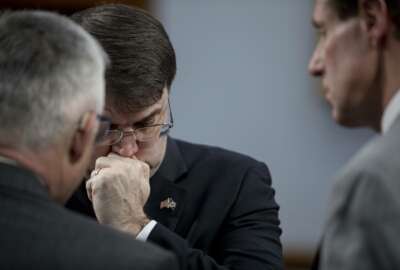
Ensuring the federal IT workforce of the future
In today's Federal Newscast, the Chief Information Officers Council says government needs a new pay and personnel system to better recruit and compensate the fu...
To listen to the Federal Newscast on your phone or mobile device, subscribe in PodcastOne or Apple Podcasts. The best listening experience on desktop can be found using Chrome, Firefox or Safari.
- The Chief Information Officers Council says government needs a new pay and personnel system to better recruit and compensate the future federal IT workforce. That’s one of 10 recommendations the council made in a new report on the state of the federal IT workforce. The council says the current pay structure is the single biggest barrier to recruiting top IT talent. Most new IT professionals are entering government through special hiring authorities, not the usual competitive process. The CIO Council also says future IT workers demand more professional and geographic flexibility about when and where they work. And agencies need to meet those demands.
- Some important leadership positions are in the process of being filled. The Senate Homeland Security and Governmental Affairs Committee advanced Russell Vought’s nomination to lead the Office of Management and Budget. along party lines. Vought has one more committee hurdle to cross before the full Senate can vote to confirm him. The Senate oversight committee also easily advanced the nomination of Craig Leen to be inspector general at the Office of Personnel Management. Catherine Bird also cleared a committee vote along party lines. Her nomination to be general counsel at the Federal Labor Relations Authority has been pending for over a year.
- The Senate Homeland Security and Governmental Affairs Committee also approved President Trump’s two nominees to serve on the Postal Service’s Board of Governors. Donald Lee Moak served as the former president of the Air Line Pilots Association, and Bill Zollars is the former chairman of the logistics company YRC Worldwide. Neither has experience at the Postal Service, but they told lawmakers they would look at the White House postal force’s recommendations as a roadmap for long-term postal reform.
- Agriculture Department chief data officer Ted Kaouk will serve as chairman of the governmentwide CDO Council. The Trump administration stood up the council as part of the Foundations for Evidence-Based Policymaking Act that passed last year. The council held its first meeting in January, and has led work on the Federal Data Strategy’s year-one action plan. Kaouk has held several roles USDA since 2011, but has held the title of CDO for less than two years.
- Former Air Force deputy CIO Bill Marion has a new job. Marion, who left federal service in May after 28 years, is now a managing director of growth and strategy in Accenture Federal Services’ Defense and Intelligence practice. In that role, he will work with federal clients to develop and execute technology transformation and mission-support strategies to deal with cyber and other threats. Marion was the Air Force deputy CIO for nearly four years and also worked in the service’s intelligence and cybersecurity offices.
- As election and election security concerns heat up, a small federal agency rounds out its management ranks. Election Assistance Commission chairman Ben Hovland announces the appointment of Mona Harrington as executive director and Kevin Rayburn as General Counsel. They were voted in by unanimous vote of the commissioners. Harrington has been acting executive director for since October 2019. Rayburn arrives from the Georgia Secretary of State Office. The commission creates guidelines for states and cities, accredits test labs, and certifies voting systems.
- Two progressive lawmakers have introduced legislation that’s meant to gather more accurate data on civilian casualties during U.S. military operations. The bill, introduced by Senator Elizabeth Warren (D-Mass.) yesterday, has five major provisions, including ones that would require DoD to make civilian casualty investigations more independent and publish the results in a public database. Rep. Ro Khanna (D-Calif.) is sponsoring similar legislation in the House.
- The Defense Department’s $7.6 billion cloud email and collaboration contract continues to be hung up by protests nearly 10 months after the initial award. The General Services Administration told the Government Accountability Office it would take corrective action for a second time on the Defense Enterprise Office Solutions or DEOS. GAO dismissed the latest protest from Perspecta on June 8. GSA told GAO it will amend the solicitation, ask for revised proposals and take other steps to address the pre-award complaint. (Federal News Network)
- GSA to test out a new contract writing system in 100 days. The General Services Administration’s plan to modernize its contract writing system will start with a proof of concept. The agency awarded Sevatec a $7.5 million task order to launch a comprehensive, flexible, scalable and highly configurable system by the fall. GSA says if the Contract Acquisition Life-cycle Management or CALM system is a success, it will award additional task orders to expand the contract writing system’s functionalities and broaden its use across the agency. GSA says the goal of CALM is to reduce the burden on the contracting workforce and make it easier to do business with GSA.
- The Pentagon says it’s awarded another $135 million in Defense Production Act contracts in response to COVID-19. The latest contracts are mostly targeted toward keeping portions of the industrial base afloat and expanding production capacity for essential goods. But DoD says previous DPA awards have also dramatically increased the production of N95 masks. Officials say by the end of the year, the U.S.’s domestic capacity will be about a billion masks per year. That would be enough to meet even the highest demand levels the U.S. saw during the first peak of coronavirus infections.
- The Office of Management and Budget is giving agencies two weeks to outline how they’ll roll back regulations to help jump-start the economy during the pandemic. OMB released a memo to agencies as a follow-up to an executive order President Donald Trump signed in May. Agencies should let OMB know about final rules, waivers, or other regulatory actions they plan to issue in the next six months that would help boost the economy. The memo also tells agencies to consider making some temporary regulatory actions permanent. (White House)
- The Department of Veterans Affairs is facing the same medical supply chain problems that everyone else is. The Veterans Health Administration says it has a 30-day supply of personal protective equipment on hand today. But it’s not enough to adequately handle a potential second wave of the coronavirus pandemic. Top VHA official Richard Stone says VA needs at least 60-days worth of supplies, if not a six month supply to feel prepared for a second surge. VA is working with the Defense Department and FEMA to set up four regional readiness centers to collect and stockpile supplies. The department says it can no longer rely on the same manufacturers and vendors to keep VA’s shelves fully stocked. (Federal News Network)
Copyright © 2024 Federal News Network. All rights reserved. This website is not intended for users located within the European Economic Area.
Eric White
Eric White is news anchor and Federal Drive producer at Federal News Network.
Follow @FEDERALNEWSCAST
Related Stories

VA doesn’t have the personal protective equipment it needs to handle second pandemic wave
Related Topics
Agriculture Department
All News
Ben Hovland
Benefits
Bill Marion
CIO Council
CIO News
Defense Production Act
Elizabeth Warren
Federal Drive
Federal Newscast
General Services Administration
Government Accountability Office
Hiring/Retention
IT Modernization
Management
Office of Management and Budget
Pay
Pay & Benefits
People
Ro Khanna
Technology
Ted Kaouk
Tom Temin
Workforce



